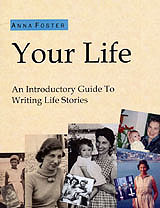
Home > Your Life Writing Guide Contents > Should I Sell My Book?
15. Should I Sell My Book?

The simple answer is no, not if you want to make money from it. This information is included if you want to sell a few copies locally or raise funds for charity.
ISBN Number and Barcode
You can obtain an International Standard Book Number (ISBN) and barcode for your book if you want to sell it, though you are not legally required to do so.
The ISBN number is the 13-digit number which forms part of the bar code on the back cover. ISBN numbers are obtained in batches of 10 from Nielsen BookData.
The barcode is purchased separately: Nielsen BookData provides a list of barcode providers.
For each book you need to fill in a New Titles Registration form and send it to Nielsen BookData. Name yourself as publisher and distributor, and bookshops will contact you if they want to order copies.
You will have to send six copies of your book to the British Library and others. Your book will be listed in an issue of The Bookseller, the magazine for the book trade.
Marketing Your Book
In the first instance, your book may find an audience in the local area. Contact bookshops to see if they would be interested in stocking it.
To promote your book, try to get it reviewed in the local newspaper. Send a copy of the book and a covering letter to the reporter responsible for your area. Remember to ask the paper to include details of how to obtain the book and the price.
If your book is about a particular interest or hobby you might be able to persuade a magazine to either interview you or carry an excerpt from the book.
Again, write a covering letter, enclose a copy and highlight the best bits. Journalists are busy and may not have time to read the whole book.
Newspapers and magazines often need a photograph to illustrate the piece. Don't enclose originals of pictures at this stage but mention them in your covering letter. The publication may decide to take a picture of you.
Price
You must price your book competitively if you hope to sell it in bookshops.
Paperbacks are often priced between £6 and £10. Bear in mind that your production costs may exceed this figure and therefore make it unprofitable to sell. Bookshops will take 35-40% of the cover price.
Don't raise your expectations about selling your book. It could detract from the enjoyment of writing it if sales don't go well. Family and friends may praise your book, but they are predisposed to like it – and may be polite. A stranger is likely to be more critical.
Collective memoirs, village, picture books and school cookery books are easier to sell at a profit than individual life stories, because the print run is usually longer. The audience is also clearly defined — eg. a school, a hospice or a community group — and it is easier to predict sales. With your self-publisher or printer, work out the printing and production costs, how many copies you can sell and, hence, your break-even point. Then, add on a profit margin — up to 50% of costs is reasonable — and work out your cover price and overall profit.
Do you have any questions? I am always happy to answer individual queries, so please contact me.

